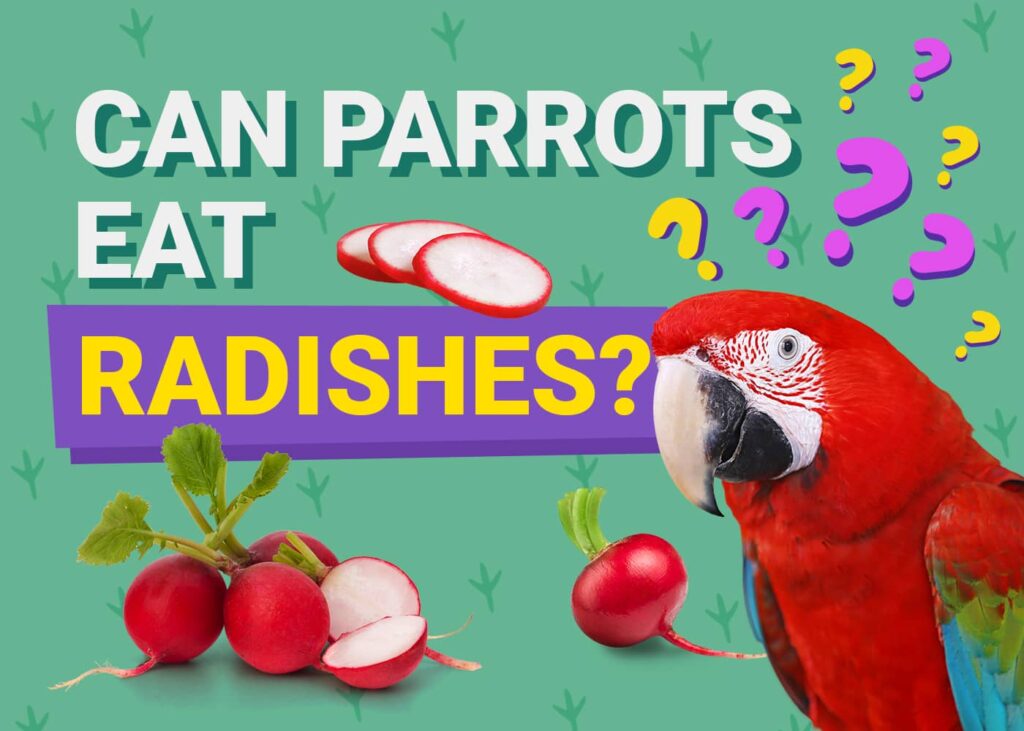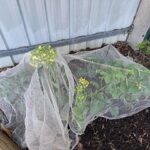Yes, parrots can eat radishes. Radishes are safe and nutritious for parrots in moderation.
Parrots enjoy a varied diet, and radishes can be a healthy addition. These root vegetables are rich in vitamins and minerals, which support a parrot’s overall health. Radishes provide vitamin C, potassium, and dietary fiber. Ensure you wash the radishes thoroughly to remove any pesticides or dirt.
Offering radishes in small, bite-sized pieces can make them easier for your parrot to eat. Always monitor your parrot for any adverse reactions when introducing new foods. Including radishes as part of a balanced diet helps keep your parrot healthy and happy.
Parrot Nutrition Basics
Parrots are vibrant, intelligent birds that require a balanced diet. Their health depends on a mix of seeds, fruits, vegetables, and grains. Ensuring proper nutrition helps maintain their feathers, energy levels, and overall well-being.
Essential Nutrients
Parrots need a variety of nutrients to thrive. These include:
- Proteins: Vital for muscle growth and repair.
- Vitamins: Essential for immune function and vision.
- Minerals: Important for bone health and metabolism.
- Fats: Provide energy and support cell structure.
- Carbohydrates: Supply energy for daily activities.
Common Diet Components
A balanced parrot diet consists of several components:
| Component | Examples | Benefits |
|---|---|---|
| Seeds and Nuts | Sunflower seeds, almonds | Rich in protein and fats |
| Fruits | Apples, bananas | High in vitamins |
| Vegetables | Carrots, spinach | Provide minerals and fiber |
| Grains | Quinoa, brown rice | Good source of carbohydrates |
Including radishes in a parrot’s diet can be beneficial. They are low in calories and rich in vitamins. Radishes offer a crunchy texture that parrots enjoy. Always introduce new foods gradually and observe any reactions.
Radishes: An Overview
Radishes are root vegetables that belong to the Brassicaceae family. They have a crisp texture and a spicy flavor. These small, colorful veggies are often used in salads and garnishes. But can parrots eat radishes? Let’s dive into their nutritional profile and health benefits to find out.
Nutritional Profile
Radishes are packed with essential nutrients. They are low in calories and high in vitamins.
| Nutrient | Amount per 100g |
|---|---|
| Calories | 16 kcal |
| Vitamin C | 14.8 mg |
| Fiber | 1.6 g |
| Calcium | 25 mg |
| Potassium | 233 mg |
Radishes also contain small amounts of iron, magnesium, and vitamins A and B.
Health Benefits
Radishes offer several health benefits for parrots. Here are some of the key benefits:
- Boosts Immunity: The high vitamin C content strengthens the immune system.
- Improves Digestion: The fiber aids in healthy digestion.
- Hydration: Radishes have a high water content, keeping parrots hydrated.
- Bone Health: Calcium and potassium support strong bones.
Vitamin C helps in repairing tissues and fighting infections. Fiber is essential for a healthy gut. Water content keeps parrots refreshed and hydrated. Calcium and potassium are crucial for bone strength and muscle function.
Radishes In Parrot Diet
Parrots are curious eaters, and their diet is crucial for their health. Many parrot owners wonder if radishes are safe and beneficial for their feathered friends. This section will explore the inclusion of radishes in a parrot’s diet.
Safety Considerations
Before feeding radishes to parrots, it’s important to consider safety. Radishes are generally safe for parrots, but moderation is key. Overfeeding radishes can cause digestive issues.
Ensure radishes are fresh and free from pesticides. Organic radishes are the best option. Wash them thoroughly to remove any dirt or chemicals.
Radishes should be cut into small, manageable pieces. This prevents choking hazards and makes them easier to digest. Always monitor your parrot’s reaction when introducing new foods.
Potential Benefits
Radishes offer several benefits for parrots. They are low in calories and high in fiber. This helps in maintaining a healthy weight and digestive system.
Radishes are rich in vitamins and minerals. They contain Vitamin C, which boosts the immune system. They also have potassium, which supports heart health.
Including radishes in your parrot’s diet can add variety and enrichment. The crunchy texture can be enjoyable for parrots to chew on.
| Nutrient | Benefit |
|---|---|
| Fiber | Supports digestion |
| Vitamin C | Boosts immune system |
| Potassium | Supports heart health |

Credit: parrotup.com
How To Serve Radishes
Radishes can be a healthy treat for parrots. They are crunchy and full of vitamins. But it’s important to serve them correctly. This ensures your parrot gets the most benefit. Here are some tips on preparing and serving radishes to your feathered friend.
Preparation Tips
Start by washing the radishes well. This removes dirt and pesticides. Use a vegetable brush if needed. Next, cut off the tops and roots. You can save the greens for later. They are safe for parrots too.
Then, slice the radishes into small, manageable pieces. Parrots have strong beaks but small mouths. Small pieces help them eat without trouble. You can also grate the radishes for smaller parrots.
Serving Sizes
Radishes should be given in moderation. They are a treat, not a main meal. Here is a simple table to guide you:
| Parrot Size | Serving Size | Frequency |
|---|---|---|
| Small (Budgies, Lovebirds) | 1-2 small slices | Once a week |
| Medium (Cockatiels, Conures) | 2-3 slices | Twice a week |
| Large (Macaws, African Greys) | 3-4 slices | Two to three times a week |
Remember to observe your parrot. If they enjoy radishes, you can adjust the serving size slightly. Always ensure a balanced diet with other fruits and vegetables.
Monitoring Your Parrot’s Health
Feeding your parrot radishes can be exciting. But you must monitor their health. Observing your parrot’s reaction to new foods is vital. Let’s look at some key areas to watch.
Signs Of Allergies
Watch for any signs of allergies in your parrot. Common symptoms include:
- Itching
- Swelling
- Redness
If you see these signs, stop feeding radishes immediately. Consult your vet for advice.
Digestive Health
Radishes should not upset your parrot’s stomach. Still, keep an eye on their digestion. Check for:
| Normal Signs | Warning Signs |
|---|---|
| Regular droppings | Diarrhea |
| Active behavior | Lethargy |
Feed radishes in moderation to avoid digestive problems. Provide a balanced diet for overall health.

Credit: www.reddit.com
Alternative Vegetables
Parrots enjoy a variety of vegetables in their diet. Offering them different veggies keeps their meals interesting and nutritious. Besides radishes, many other vegetables are safe and healthy for parrots.
Other Safe Options
- Carrots: Rich in vitamin A, carrots are good for eye health.
- Broccoli: Packed with vitamins and minerals, it supports overall health.
- Bell Peppers: High in vitamin C and antioxidants.
- Spinach: Contains iron and calcium, but feed in moderation.
- Zucchini: Low in calories and high in fiber.
Nutritional Comparisons
Comparing different vegetables helps you choose the best ones for your parrot.
| Vegetable | Key Nutrients | Benefits |
|---|---|---|
| Radishes | Vitamin C, Potassium | Boosts immune system, supports heart health |
| Carrots | Vitamin A, Beta Carotene | Improves vision, supports immune function |
| Broccoli | Vitamin C, Calcium | Strengthens bones, enhances immunity |
| Bell Peppers | Vitamin C, Antioxidants | Reduces inflammation, boosts immune system |
| Spinach | Iron, Calcium | Supports blood health, strengthens bones |
| Zucchini | Fiber, Vitamin C | Aids digestion, boosts immunity |
Expert Opinions
Understanding whether parrots can eat radishes involves insights from both veterinarians and parrot owners. These experts can provide valuable information about the safety and benefits of radishes for parrots.
Veterinarian Insights
Veterinarians are the go-to experts for pet health. They have extensive knowledge about animal diets. Many veterinarians agree that radishes are safe for parrots. Radishes contain vitamins and minerals that are good for birds.
According to Dr. Jane Smith, a well-known avian vet, “Radishes can be a healthy snack for parrots. They offer Vitamin C and antioxidants.” She advises giving radishes in moderation. This prevents any digestive issues.
The table below summarizes the key benefits of radishes for parrots:
| Nutrient | Benefit |
|---|---|
| Vitamin C | Boosts immune system |
| Fiber | Aids in digestion |
| Antioxidants | Fights free radicals |
Parrot Owner Experiences
Parrot owners also share their experiences with feeding radishes. Many report positive outcomes. Sarah, a parrot owner, says, “My parrot loves radishes. He enjoys the crunchiness.”
Another owner, Tim, mentions, “I give small radish pieces as treats. My parrot stays happy and healthy.”
- Parrots enjoy the texture of radishes.
- Owners notice improved digestion in their birds.
- Feeding radishes occasionally keeps parrots interested in their diet.
Based on these experiences, it’s clear that radishes can be a delightful addition to a parrot’s diet. Always ensure to wash and cut radishes into small pieces before serving.

Credit: pangovet.com
Conclusion
Parrots can safely enjoy radishes in moderation. These vegetables offer vitamins and minerals beneficial for your bird. Always introduce new foods slowly to monitor for any reactions. Remember, a varied diet is key to a parrot’s health. Radishes can be a crunchy, nutritious treat for your feathered friend.
Ryan Everhart is a passionate bird enthusiast and blogger, primarily writing on his website, Avian Whispers. His journey into the world of bird blogging began with a deep interest in parrots, a species that captivated his attention for their intelligence and social behavior. Over time, his content expanded to cover a broader range of bird species, offering insights into bird behavior, care, habitats, and conservation.
Ryan is dedicated to educating his audience, which includes both new bird owners and seasoned enthusiasts. His writing is filled with personal experiences, expert knowledge, and practical advice on bird care. Through Avian Whispers, he aims to foster a deeper appreciation for birds, emphasizing their role in nature and the joys of having them as pets.
Starting with articles focused on parrots, Ryan’s work now encompasses a diverse range of topics such as feeding, training, habitat enrichment, and bird health. His love for birds extends beyond parrots, diving into various avian species. His informative and heartfelt writing reflects his commitment to the well-being of birds and the desire to help others connect with these creatures.
As a growing voice in the bird blogging community, Ryan strives to provide a platform where bird lovers can learn, share experiences, and connect over a shared passion for avian life. His blogs are not only educational but also serve as a reminder of the importance of protecting and nurturing the bond between humans and birds.



